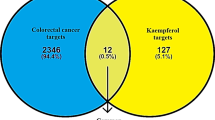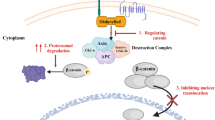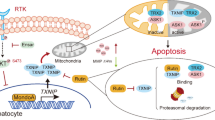Abstract
Colorectal cancer (CRC) is regarded as one of the commonest cancer types around the world. Due to the poor understanding on the causes of CRC formation and progression, this study sets out to investigate the physiological mechanisms by which Astragalus mongholicus Bunge-Curcuma aromatica Salisb. (ARCR) regulates CRC growth and metastasis, and the role in which M2 macrophage polarization plays in this process. An orthotopic-transplant model of CRC was established to evaluate the influence of ARCR on the polarization of M2 macrophage and the growth and metastasis of tumors. Next, the binding affinity among Sp1, ZFAS1, miR-153-5p, and CCR5 was identified using multiple assays. Finally, after co-culture of bone marrow–derived macrophages (BMDM) with CRC cell line CT26.WT, the cell proliferative, invasive, and migrated abilities were assessed in gain- or loss-of-function experiments. ARCR inhibited the infiltration of M2 macrophages into tumor microenvironment to suppress the CRC growth and metastasis in vivo. Additionally, ARCR inhibited the transcription of ZFAS1 by reducing Sp1 expression to repress M2 macrophage polarization. Moreover, ZFAS1 competitively binds to miR-153-3p to upregulate the CCR5 expression. Finally, ARCR suppressed the polarization of M2 macrophages to inhibit the tumor growth and tumor metastasis in CRC by mediating the Sp1/ZFAS1/miR-153-3p/CCR5 regulatory axis. Collectively, ARCR appears to suppress the CRC cell growth and metastasis by suppressing M2 macrophage polarization via Sp1/ZFAS1/miR-153-3p/CCR5 regulatory axis.
Graphical abstract
1. ARCR suppress the CRC cell growth and metastasis
2. ZFAS1 promotes CCR5 expression by competitively binding to miR-153-3p.
3. Sp1 promotes M2 macrophage polarization by activating ZFAS1 via miR-153-3p/CCR5.
4. The study unveiled a protective target against CRC.








Similar content being viewed by others
Data and materials availability
The datasets generated and/or analyzed during the current study are available from the corresponding author on reasonable request.
Code availability
Not applicable.
References
Calibasi-Kocal G, Pakdemirli A, Bayrak S, Ozupek NM, Sever T, Basbinar Y, et al. Curcumin effects on cell proliferation, angiogenesis and metastasis in colorectal cancer. J Buon. 2019;24(4):1482–7.
Chang LY, Lin YC, Mahalingam J, Huang CT, Chen TW, Kang CW, et al. Tumor-derived chemokine CCL5 enhances TGF-beta-mediated killing of CD8(+) T cells in colon cancer by T-regulatory cells. Cancer Res. 2012;72(5):1092–102. https://doi.org/10.1158/0008-5472.CAN-11-2493.
Chang HL, Kuo YH, Wu LH, Chang CM, Cheng KJ, Tyan YC, et al. The extracts of Astragalus membranaceus overcome tumor immune tolerance by inhibition of tumor programmed cell death protein ligand-1 expression. Int J Med Sci. 2020;17(7):939–45. https://doi.org/10.7150/ijms.42978.
Chen M, May BH, Zhou IW, Sze DM, Xue CC, Zhang AL. Oxaliplatin-based chemotherapy combined with traditional medicines for neutropenia in colorectal cancer: a meta-analysis of the contributions of specific plants. Crit Rev Oncol Hematol. 2016;105:18–34. https://doi.org/10.1016/j.critrevonc.2016.07.002.
Chen X, Zeng K, Xu M, Hu X, Liu X, Xu T, et al. SP1-induced lncRNA-ZFAS1 contributes to colorectal cancer progression via the miR-150-5p/VEGFA axis. Cell Death Dis. 2018;9(10):982. https://doi.org/10.1038/s41419-018-0962-6.
Cheng Y, Wu J, Qin B, Zou BC, Wang YH, Li Y. CREB1-induced lncRNA LEF1-AS1 contributes to colorectal cancer progression via the miR-489/DIAPH1 axis. Biochem Biophys Res Commun. 2020;526(3):678–84. https://doi.org/10.1016/j.bbrc.2020.03.153.
Chun-Bin S, Yi Y, Qin-Yi W, Yang L, Jing-Ze Y, Hai-Jing X, et al. The main active components of Curcuma zedoaria reduces collagen deposition in human lung fibroblast via autophagy. Mol Immunol. 2020;124:109–16. https://doi.org/10.1016/j.molimm.2020.05.017.
Cui X, Piao C, Lv C, Lin X, Zhang Z, Liu X. ZNFX1 anti-sense RNA 1 promotes the tumorigenesis of prostate cancer by regulating c-Myc expression via a regulatory network of competing endogenous RNAs. Cell Mol Life Sci. 2020;77(6):1135–52. https://doi.org/10.1007/s00018-019-03226-x.
Dong D, Mu Z, Wei N, Sun M, Wang W, Xin N, et al. Long non-coding RNA ZFAS1 promotes proliferation and metastasis of clear cell renal cell carcinoma via targeting miR-10a/SKA1 pathway. Biomed Pharmacother. 2019;111:917–25. https://doi.org/10.1016/j.biopha.2018.12.143.
Huang Q, Xia J, Wang L, Wang X, Ma X, Deng Q, et al. miR-153 suppresses IDO1 expression and enhances CAR T cell immunotherapy. J Hematol Oncol. 2018;11(1):58. https://doi.org/10.1186/s13045-018-0600-x.
La Vecchia S, Sebastian C. Metabolic pathways regulating colorectal cancer initiation and progression. Semin Cell Dev Biol. 2020;98:63–70. https://doi.org/10.1016/j.semcdb.2019.05.018.
Lee TK, Lee D, Lee SR, Ko YJ, Sung Kang K, Chung SJ, et al. Sesquiterpenes from Curcuma zedoaria rhizomes and their cytotoxicity against human gastric cancer AGS cells. Bioorg Chem. 2019;87:117–22. https://doi.org/10.1016/j.bioorg.2019.03.015.
Lee SB, Lee JS, Moon SO, Lee HD, Yoon YS, Son CG. A standardized herbal combination of Astragalus membranaceus and Paeonia japonica, protects against muscle atrophy in a C26 colon cancer cachexia mouse model. J Ethnopharmacol. 2021;267:113470. https://doi.org/10.1016/j.jep.2020.113470.
Li W, Li C, Zheng H, Chen G, Hua B. Therapeutic targets of Traditional Chinese Medicine for colorectal cancer. J Tradit Chin Med. 2016;36(2):243–9. https://doi.org/10.1016/s0254-6272(16)30034-6.
Li B, Sun H, Zhang J. LncRNA DSCAM-AS1 promotes colorectal cancer progression by acting as a molecular sponge of miR-384 to modulate AKT3 expression. Aging (Albany NY). 2020a;12(10):9781–92. https://doi.org/10.18632/aging.103243.
Li SS, Zhu HJ, Li JY, Tian LM, Lv DM. MiRNA-875-3p alleviates the progression of colorectal cancer via negatively regulating PLK1 level. Eur Rev Med Pharmacol Sci. 2020b;24(3):1126–33. https://doi.org/10.26355/eurrev_202002_20163.
Li X, Luo Y, Liu L, Cui S, Chen W, Zeng A, et al. The long noncoding RNA ZFAS1 promotes the progression of glioma by regulating the miR-150-5p/PLP2 axis. J Cell Physiol. 2020c;235(3):2937–46. https://doi.org/10.1002/jcp.29199.
Liang ZX, Liu HS, Wang FW, Xiong L, Zhou C, Hu T, et al. LncRNA RPPH1 promotes colorectal cancer metastasis by interacting with TUBB3 and by promoting exosomes-mediated macrophage M2 polarization. Cell Death Dis. 2019;10(11):829. https://doi.org/10.1038/s41419-019-2077-0.
Liu JJ, Li Y, Yang MS, Chen R, Cen CQ. SP1-induced ZFAS1 aggravates sepsis-induced cardiac dysfunction via miR-590-3p/NLRP3-mediated autophagy and pyroptosis. Arch Biochem Biophys. 2020;695:108611. https://doi.org/10.1016/j.abb.2020.108611.
Long J, He Q, Yin Y, Lei X, Li Z, Zhu W. The effect of miRNA and autophagy on colorectal cancer. Cell Prolif. 2020;53(10):e12900. https://doi.org/10.1111/cpr.12900.
Luan W, Shi Y, Zhou Z, Xia Y, Wang J. circRNA_0084043 promote malignant melanoma progression via miR-153-3p/Snail axis. Biochem Biophys Res Commun. 2018;502(1):22–9. https://doi.org/10.1016/j.bbrc.2018.05.114.
Nishikawa G, Kawada K, Nakagawa J, Toda K, Ogawa R, Inamoto S, et al. Bone marrow-derived mesenchymal stem cells promote colorectal cancer progression via CCR5. Cell Death Dis. 2019;10(4):264. https://doi.org/10.1038/s41419-019-1508-2.
Ren Y, Zhang H, Jiang P. MicroRNA-382 inhibits cell growth and migration in colorectal cancer by targeting SP1. Biol Res. 2018;51(1):51. https://doi.org/10.1186/s40659-018-0200-9.
Suarez-Carmona M, Chaorentong P, Kather JN, Rothenheber R, Ahmed A, Berthel A, et al. CCR5 status and metastatic progression in colorectal cancer. Oncoimmunology. 2019;8(9):e1626193. https://doi.org/10.1080/2162402X.2019.1626193.
Sui H, Tan H, Fu J, Song Q, Jia R, Han L, et al. The active fraction of Garcinia yunnanensis suppresses the progression of colorectal carcinoma by interfering with tumorassociated macrophage-associated M2 macrophage polarization in vivo and in vitro. FASEB J. 2020;34(6):7387–403. https://doi.org/10.1096/fj.201903011R.
Sun X, Ng TTH, Sham KWY, Zhang L, Chan MTV, Wu WKK, et al. Bufalin, a Traditional Chinese Medicine compound, prevents tumor formation in two murine models of colorectal cancer. Cancer Prev Res (Phila). 2019;12(10):653–66. https://doi.org/10.1158/1940-6207.CAPR-19-0134.
Tan B, Shi X, Zhang J, Qin J, Zhang N, Ren H, et al. Inhibition of Rspo-Lgr4 facilitates checkpoint blockade therapy by switching macrophage polarization. Cancer Res. 2018;78(17):4929–42. https://doi.org/10.1158/0008-5472.CAN-18-0152.
Tan X, Xu M, Liu F, Xu M, Yao Y, Tang D. Antimetastasis Effect of Astragalus membranaceus-Curcuma zedoaria via beta-catenin mediated CXCR4 and EMT signaling pathway in HCT116. Evid Based Complement Alternat Med. 2019;2019:9692350. https://doi.org/10.1155/2019/9692350.
Tseng A, Yang CH, Chen CH, Chen CH, Hsu SL, Lee MH, et al. An in vivo molecular response analysis of colorectal cancer treated with Astragalus membranaceus extract. Oncol Rep. 2016;35(2):659–68. https://doi.org/10.3892/or.2015.4441.
Wang H. MicroRNAs and apoptosis in colorectal cancer. Int J Mol Sci. 2020;21(15):5353. https://doi.org/10.3390/ijms21155353.
Wang Y, Auyeung KK, Zhang X, Ko JK. Astragalus saponins modulates colon cancer development by regulating calpain-mediated glucose-regulated protein expression. BMC Complement Altern Med. 2014;14:401. https://doi.org/10.1186/1472-6882-14-401.
Wang D, Wang X, Si M, Yang J, Sun S, Wu H, et al. Exosome-encapsulated miRNAs contribute to CXCL12/CXCR4-induced liver metastasis of colorectal cancer by enhancing M2 polarization of macrophages. Cancer Lett. 2020a;474:36–52. https://doi.org/10.1016/j.canlet.2020.01.005.
Wang Q, Dou Y, Zhao S, Wei M, Sun D, He Y, et al. Analysis of chemical consistency and the anti-tumor activity of Huangqi-Ezhu (HQ-EZ) concentrated-granules and decoction. Ann Palliat Med. 2020b;9(4):1648–59. https://doi.org/10.21037/apm-19-592.
Wang X, Gao S, Song L, Liu M, Sun Z, Liu J. Astragaloside IV antagonizes M2 phenotype macrophage polarization-evoked ovarian cancer cell malignant progression by suppressing the HMGB1-TLR4 axis. Mol Immunol. 2021;130:113–21. https://doi.org/10.1016/j.molimm.2020.11.014.
Wei W, Li ZP, Bian ZX, Han QB. Astragalus polysaccharide RAP induces macrophage phenotype polarization to M1 via the Notch signaling pathway. Molecules. 2019;24(10):2016. https://doi.org/10.3390/molecules24102016.
Weng W, Goel A. Curcumin and colorectal cancer: an update and current perspective on this natural medicine. Semin Cancer Biol. 2020. https://doi.org/10.1016/j.semcancer.2020.02.011.
Wu TH, Li YY, Wu TL, Chang JW, Chou WC, Hsieh LL, et al. Culture supernatants of different colon cancer cell lines induce specific phenotype switching and functional alteration of THP-1 cells. Cell Immunol. 2014;290(1):107–15. https://doi.org/10.1016/j.cellimm.2014.05.015.
Wu S, Meng Q, Zhang C, Sun H, Lu R, Gao N, et al. DR4 mediates the progression, invasion, metastasis and survival of colorectal cancer through the Sp1/NF1 switch axis on genomic locus. Int J Cancer. 2018;143(2):289–97. https://doi.org/10.1002/ijc.31318.
Xu X, Chen X, Xu M, Liu X, Pan B, Qin J, et al. miR-375-3p suppresses tumorigenesis and partially reverses chemoresistance by targeting YAP1 and SP1 in colorectal cancer cells. Aging (Albany NY). 2019;11(18):7357–85. https://doi.org/10.18632/aging.102214.
Yang M, Liu J, Piao C, Shao J, Du J. ICAM-1 suppresses tumor metastasis by inhibiting macrophage M2 polarization through blockade of efferocytosis. Cell Death Dis. 2015;6:e1780. https://doi.org/10.1038/cddis.2015.144.
Yin G, Cheng X, Tao W, Dong Y, Bian Y, Zang W, et al. Comparative analysis of multiple representative components in the herb pair Astragali Radix-Curcumae Rhizoma and its single herbs by UPLC-QQQ-MS. J Pharm Biomed Anal. 2018;148:224–9. https://doi.org/10.1016/j.jpba.2017.09.015.
Zhao S, Wu J, Zheng F, Tang Q, Yang L, Li L, et al. beta-elemene inhibited expression of DNA methyltransferase 1 through activation of ERK1/2 and AMPKalpha signalling pathways in human lung cancer cells: the role of Sp1. J Cell Mol Med. 2015;19(3):630–41. https://doi.org/10.1111/jcmm.12476.
Zhao XS, Wang YN, Lv M, Kong Y, Luo HX, Ye XY, et al. miR-153-3p, a new bio-target, is involved in the pathogenesis of acute graft-versus-host disease via inhibition of indoleamine- 2,3-dioxygenase. Oncotarget. 2016;7(30):48321–34. https://doi.org/10.18632/oncotarget.10220.
Zhao S, Mi Y, Guan B, Zheng B, Wei P, Gu Y, et al. Tumor-derived exosomal miR-934 induces macrophage M2 polarization to promote liver metastasis of colorectal cancer. J Hematol Oncol. 2020;13(1):156. https://doi.org/10.1186/s13045-020-00991-2.
Funding
This work was supported by the National Natural Science Foundation of China (Grant No. 81904059, 81904066), the Natural Science Research in Jiangsu Province (19KJB360015, BK20190803), and the Youth Project of Nanjing University of Chinese Medicine (NZY81904059, NZY81904066,) and the Priority Academic Program Development of Jiangsu Higher Education Institutions (Integration of Chinese and Western Medicine).
Author information
Authors and Affiliations
Contributions
Junfei Gu and Ruolan Sun wrote the paper; Decai Tang and Fuyan Liu conceived the experiments; Xiangwei Chang and Qiaohan Wang analyzed the data; Decai Tang and Fuyan Liu collected and provided the sample for this study. All authors have read and approved the final submitted manuscript.
Corresponding author
Ethics declarations
Consent to participate
Not applicable.
Consent for publication
Consent for publication was obtained from the participants.
Conflict of interest
The authors declare no competing interests.
Additional information
Publisher’s note
Springer Nature remains neutral with regard to jurisdictional claims in published maps and institutional affiliations.
Supplementary Information
Table S1, Table S2 and Table S3
(DOCX 75 KB)
Rights and permissions
About this article
Cite this article
Gu, J., Sun, R., Tang, D. et al. Astragalus mongholicus Bunge-Curcuma aromatica Salisb. suppresses growth and metastasis of colorectal cancer cells by inhibiting M2 macrophage polarization via a Sp1/ZFAS1/miR-153-3p/CCR5 regulatory axis. Cell Biol Toxicol 38, 679–697 (2022). https://doi.org/10.1007/s10565-021-09679-w
Received:
Accepted:
Published:
Issue Date:
DOI: https://doi.org/10.1007/s10565-021-09679-w




